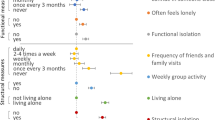Summary
Few data exist on the long-term social outcome of patients with inherited metabolic disorders, despite the fact that increasing numbers are surviving into adulthood. Here we report the findings of 329 patients aged from 11 to 70 years, of whom 172 had phenylketonuria, 38 had homocystinuria and 33 had galactosaemia. Twenty-eight per cent had no formal education qualifications, 59% were employed, but only 17% were in professional jobs (social classes I and II). The time of diagnosis and treatment had a significant impact on outcome in phenylketonuria, as did pyridoxine responsiveness or lack of it in homocystinuria. Effects on outcome in galactosaemia were not clear. Social integration is an important outcome of treatment of chronic disorders in childhood and warrants further study in this growing patient population.
Similar content being viewed by others
References
Gaustadnes M, Wilcken B, Oliveriusova J, et al (2002) The molecular basis of cystathionine beta-synthase deficiency in Australian patients: genotype–phenotype correlations and response to treatment. Hum Mutat 20: 117–126.
Gitzelmann R, Steinmann B (1984) Galactosemia: how does long-term treatment change the outcome? Enzyme 32: 37–46.
Koch R, Yusin M, Fishler K (1985) Successful adjustment to society by adults with phenylketonuria. J Inherit Metab Dis 8: 209–211.
Koch R, Azen C, Friedman EG, Fishler K, Baumann-Frischling C, Lin T (1996) Care of the adult with phenylketonuria. Eur J Pediatr 155(supplement 1): S90–S92.
Lee PJ (2002) Growing older: the adult metabolic clinic. J Inherit Metab Dis 25: 252–260.
Mudd SH, Skovby F, Levy HL, et al (1985) The natural history of homocystinuria due to cystathionine beta-synthase deficiency. Am J Hum Genet 37: 1–31.
Schmidt H, Burgard P, Pietz J, Rupp A (1996) Intelligence and professional career in young adults treated early for phenylketonuria. Eur J Pediatr 155(supplement 1): S97–S100.
Schweitzer S, Shin Y, Jakobs C, Brodehl J (1993) Long-term outcome in 134 patients with galactosaemia. Eur J Pediatr 152: 36–43.
Schweitzer-Krantz S (2003) Early diagnosis of inherited metabolic disorders towards improving outcome: the controversial issue of galactosaemia. Eur J Pediatr 162(supplment 1): S50–S53.
Shield JP, Wadsworth EJ, MacDonald A, et al (2000) The relationship of genotype to cognitive outcome in galactosaemia. Arch Dis Child 83: 248–250.
Waggoner DD, Buist NR, Donnell GN (1990) Long-term prognosis in galactosaemia: results of a survey of 350 cases. J Inherit Metab Dis 13: 802–818.
Yap S, Rushe H, Howard PM, Naughten ER (2001) The intellectual abilities of early-treated individuals with pyridoxine-nonresponsive homocystinuria due to cystathionine beta-synthase deficiency. J Inherit Metab Dis 24: 437–447.
Author information
Authors and Affiliations
Corresponding author
Rights and permissions
About this article
Cite this article
Bhat, M., Haase, C. & Lee, P.J. Social outcome in treated individuals with inherited metabolic disorders: UK study. J Inherit Metab Dis 28, 825–830 (2005). https://doi.org/10.1007/s10545-005-0159-x
Received:
Accepted:
Issue Date:
DOI: https://doi.org/10.1007/s10545-005-0159-x




